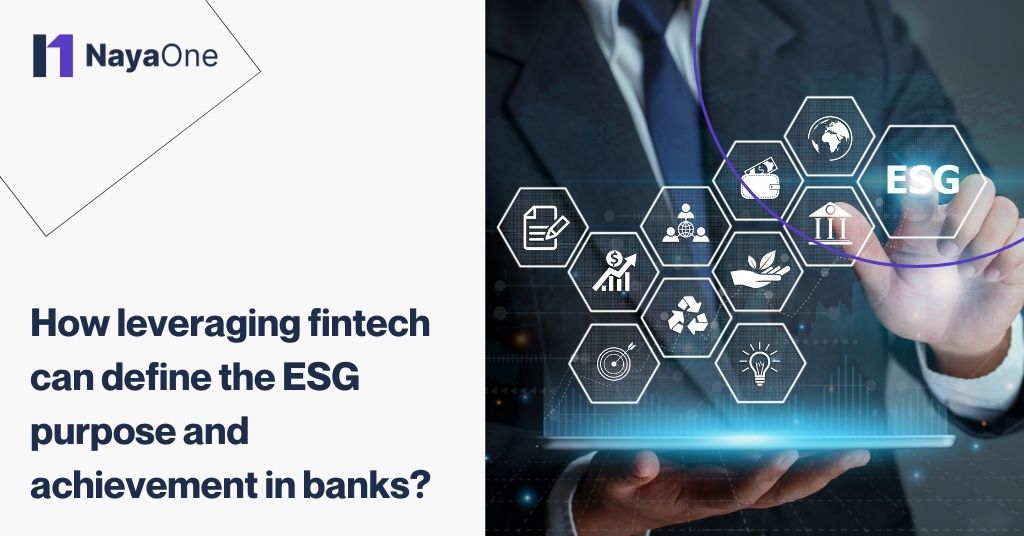Did you know that 85% of asset managers now identify ESG considerations as a top priority within their companies? This surge in focus on sustainability reflects a global shift in values, where responsible investing and ethical practices are no longer optional but essential.
Fintech has become a pivotal element in reshaping conventional banking practices by utilising technology to enhance transparency, efficiency, and inclusivity. Significantly, 88% of consumers express increased loyalty towards businesses that support social or environmental initiatives. This highlights the opportunity for financial institutions to achieve a competitive advantage by adopting ESG principles through cutting-edge technological solutions.
This article examines how fintech can enable banks to align with their ESG purpose, fostering sustainable growth through digital innovation, enhanced governance, and strategies focused on customer needs.
Is there a growing importance of ESG purposes in banking?
ESG stands for Environmental, Social, and Governance—three fundamental dimensions that inform sustainable business operations. For financial institutions, the incorporation of ESG objectives necessitates the embedding of these principles within their operational frameworks, investment strategies, and overall corporate governance.
- Environmental: Financial institutions are increasingly prioritising the reduction of their carbon emissions, funding renewable energy initiatives, and advocating for environmentally friendly investments. They are tasked with facilitating the transition to a low-carbon economy while mitigating the environmental risks linked to their lending and investment activities.
- Social: This component underscores the significance of ethical treatment of staff, promoting diversity and inclusion, and investing in local communities. Banks that are committed to social responsibility may concentrate on enhancing financial accessibility for marginalised groups or ensuring equitable practices in their offerings.
- Governance: Effective governance encompasses principles such as transparency, accountability, ethical conduct, and comprehensive risk management. For banks, this may involve reinforcing policies related to data protection, ensuring adherence to regulatory standards, and fostering ethical leadership throughout the organisation.
The influence of ESG objectives on the financial landscape is substantial, as they affect investment choices, bolster corporate reputation, and shape consumer preferences. As the demand for sustainable practices rises, banks that emphasise ESG objectives are more likely to align with market expectations, attract conscientious investors, and promote sustainable long-term growth.
Why is ESG purpose becoming a priority?
- Regulatory pressures: Across the globe, governments and regulatory bodies are implementing rigorous ESG reporting standards and sustainability-related regulations. Financial institutions are required to adhere to these changing requirements to avoid potential penalties and damage to their reputation. Notable examples include the European Union's Sustainable Finance Disclosure Regulation (SFDR) and the Securities and Exchange Commission's (SEC) climate disclosure mandates in the United States, which compel banks to disclose their ESG risks and initiatives.
- Investor demand: There is a growing trend among institutional investors and asset managers to favour companies with robust ESG credentials, as these entities are perceived to be more resilient and prepared for the future. The appetite for ESG-compliant investments is on the rise, with many investors acknowledging that companies with inadequate ESG practices may encounter heightened operational risks, regulatory challenges, and reputational issues.
- Societal expectations: Consumers, especially from younger demographics, are increasingly demanding that businesses uphold higher ethical standards. Banks are facing mounting pressure to tackle societal issues such as income inequality, climate change, and equitable access to financial services. Neglecting to address these expectations may lead to a decline in consumer trust and a reduction in market share.
What are the challenges in ESG adoption and the difficulties banks face?
As the financial world moves toward a more sustainable future, the adoption of ESG purpose has become a critical focus for banks worldwide. However, despite the growing emphasis on ESG goals, many banks face significant challenges in their implementation.
Data availability and quality
The availability of accurate and standardised ESG data is essential for informed decision-making; however, numerous banks encounter difficulties obtaining reliable and consistent data. The absence of strong metrics hampers the ability to evaluate risks and effectively track progress towards ESG objectives.
Integration with core business practices
Merging ESG goals with conventional business operations, including risk management and financial reporting, presents significant challenges. Banks frequently need to revamp their internal processes, systems, and organisational cultures to successfully incorporate ESG into their strategic frameworks.
Cost and resources
The execution of ESG initiatives typically necessitates considerable investments in technology, compliance, and training. This is particularly challenging for smaller banks, which may not possess the necessary resources to implement these changes on the required scale.
Balancing profitability with sustainability
Many banks face a conflict between achieving short-term profitability goals and making long-term investments essential for sustainable business practices. The integration of ESG considerations into lending and investment decisions may require sacrificing immediate profits for the sake of future sustainability.
Regulatory complexity
For global banks, navigating the myriad and continually changing regulations across various regions poses a significant challenge. Ensuring adherence to diverse ESG-related laws and reporting standards often demands extensive legal and administrative resources.
Despite these challenges, the long-term benefits of embracing ESG, such as enhanced brand loyalty, better risk management, and access to new markets, often outweigh the difficulties in adopting these practices.
What is fintech’s role in advancing ESG’s purpose?
By 2025, ESG-mandated assets are projected to represent half of all professionally managed investments, totalling approximately $35 trillion. As ESG principles continue to take centre stage in the financial sector, fintech is playing a pivotal role in supporting banks and investors in their pursuit of sustainability. With advancements in technology, fintech offers powerful tools that help integrate ESG goals into financial practices, making them more accessible, measurable, and actionable.
Environmental impact
A significant aspect of ESG is the environmental component. 47% of investors are emphasising environmental issues, dedicating nearly half of their sustainability efforts to the “E” in ESG. This encompasses vital challenges such as carbon emissions, resource depletion, and energy usage. Fintech innovations are making substantial strides in this domain by providing carbon tracking tools that enable banks and investors to assess their environmental impact with greater precision. Additionally, fintech facilitates green investments by simplifying the funding process for renewable energy initiatives and advocating for eco-friendly financial products. On a larger scale, digital banking contributes to environmental sustainability by decreasing dependence on paper-based operations and reducing resource consumption. These advancements empower banks to make more informed and environmentally responsible decisions, aligning their practices with global sustainability objectives.
Social responsibility
Social responsibility is another essential pillar within the ESG framework. 76% of companies view CSR as vital for enhancing brand reputation and mitigating risks. Fintech is pivotal in promoting financial inclusion, especially for underserved populations that have traditionally faced barriers to banking services. By offering digital banking solutions and innovative mobile payment systems, fintech platforms are broadening access to financial services, education, and resources. Moreover, AI-driven lending platforms provide transparent credit scoring, ensuring equitable treatment for all borrowers, including those from marginalised communities. These technological advancements are promoting social equity and driving positive transformations within the communities they serve.
Governance improvement
When it comes to governance, the fintech industry is enhancing transparency and accountability. Research reveals that only 39% of companies believe their governance practices are effective, indicating room for improvement. In this context, blockchain technology is proving invaluable by providing transparent ESG reporting systems that help reduce the risks of fraud and misreporting. Fintech-driven solutions such as AI compliance tools are enabling banks to stay ahead of rapidly evolving regulatory requirements, ensuring that they meet the highest standards of governance. With real-time monitoring and automated compliance systems, fintech is making it easier for banks to maintain transparency and adhere to legal and ethical standards, which are fundamental to good governance.
Through these technological advancements, fintech is not just supporting banks in their ESG efforts, but also driving transformative changes that enable a more sustainable, inclusive, and ethically governed financial ecosystem. As the demand for responsible investments grows, fintech’s role in advancing ESG goals will only become more critical in shaping the future of finance.

What are the benefits of integrating ESG purpose?
As businesses increasingly recognise the importance of ESG factors, 91% of corporate leaders acknowledge their duty to address these critical issues. However, achieving meaningful ESG outcomes requires more than just commitment—it requires the right tools and technologies to integrate these goals effectively into operations. Fintech provides a powerful solution, offering numerous benefits that help businesses not only meet ESG objectives but also drive long-term value.
Enhanced data analytics and reporting for precise ESG performance monitoring
A key benefit of incorporating fintech into ESG initiatives is the capacity to utilise sophisticated data analytics for precise monitoring and reporting.
As ESG factors increasingly capture the attention of both investors and consumers, the necessity for dependable ESG data has reached unprecedented levels. Fintech platforms empower organisations to gather, analyse, and disseminate ESG data with greater efficiency, thereby enhancing transparency and accountability.
By providing real-time insights into ESG performance, companies can pinpoint areas needing improvement, monitor their progress, and ensure compliance with established standards. This is particularly crucial given that only one-third of investors perceive the ESG reports they receive as high quality, and fewer than half have confidence in the ESG ratings available to them. Fintech solutions can bridge this trust deficit by delivering more accurate, comprehensive, and verifiable ESG data.
Enhanced customer trust through sustainable and ethical practices
Trust is a key driver of consumer loyalty, and ESG practices have a significant impact on this dynamic. 76% of consumers say they would stop interacting with companies that fail to prioritise environmental, employee, or community well-being.
By adopting fintech solutions that support sustainable and ethical practices, businesses can foster greater customer trust and strengthen brand loyalty. These technologies not only help businesses align with ESG goals but also provide consumers with the transparency they need to make informed purchasing decisions.
As more consumers gravitate toward companies that share their values, companies that integrate fintech for ESG can build stronger, more lasting relationships with their customer base.
Cost efficiency and innovation in achieving sustainability objectives
The integration of fintech into ESG strategies presents notable advantages in terms of cost efficiency and innovation. Fintech solutions empower organisations to optimise their operations, minimise overhead expenses, and enhance the sustainability of their practices. As sustainability increasingly becomes a focal point for consumers, businesses that can showcase both financial success and ethical responsibility are likely to reap substantial rewards.
55% of global consumers are prepared to pay an average premium of 70% for brands that prioritise sustainability. Additionally, nearly half of the consumers now consider themselves “value-driven,” favouring brands that align with their social and environmental principles. This shift in consumer preferences creates a considerable market opportunity for companies that adopt fintech solutions to fulfil their sustainability objectives.
By harnessing these technologies, organisations can boost their capacity for innovation while achieving cost efficiencies, all while upholding a robust commitment to sustainability.
The integration of fintech for ESG not only helps businesses track and improve their performance but also builds trust with consumers and investors, driving innovation and cost efficiencies. As ESG considerations become increasingly critical, fintech is emerging as a key enabler of sustainable business practices that create long-term value.
What steps can banks take to integrate fintech for ESG purposes?
As the financial sector embraces the importance of ESG goals, fintech provides an essential toolkit for banks to effectively integrate these principles into their operations. Here are key steps that banks can take to leverage fintech for ESG:
1. Partnering with fintech startups focused on sustainability
One of the most effective ways for banks to accelerate their ESG efforts is by partnering with fintech startups that specialise in sustainability. These startups often bring innovative solutions tailored to address specific ESG challenges, such as carbon tracking, sustainable investment platforms, and ethical lending models. By collaborating with these fintech innovators, banks can gain access to cutting-edge technologies and insights that enable them to integrate sustainable practices more efficiently. These partnerships not only enhance the bank’s ESG strategy but also position them as leaders in the growing green finance movement.
2. Investing in AI, blockchain, and machine learning for ESG-related data management
The ability to collect, analyse, and report ESG data accurately is central to effective ESG integration. Banks can achieve this by investing in technologies such as Artificial Intelligence (AI), Blockchain, and Machine Learning (ML). AI can help banks identify patterns in ESG data, automate compliance tasks, and enhance decision-making. Blockchain provides a transparent and secure method for reporting and tracking ESG-related activities, ensuring that data is reliable and tamper-proof. ML algorithms can optimise ESG data management by continuously improving accuracy and identifying emerging trends, which is crucial in the fast-evolving ESG landscape. These technologies are vital for building trust with regulators, investors, and consumers while ensuring that the bank’s ESG practices are transparent and data-driven.
3. Cultivating an innovative culture in banking institutions
To fully harness the capabilities of fintech in relation to ESG, banks need to cultivate an innovative culture within their organisations. This entails promoting collaboration across various departments, fostering entrepreneurial mindsets, and empowering staff to explore new technologies and concepts. By establishing an environment that prioritises innovation, banks can consistently investigate new fintech solutions that bolster their ESG initiatives. Such a culture of innovation positions banks to proactively adapt to regulatory shifts, respond to changing consumer expectations and implement sustainable practices more swiftly than their competitors.
4. Establishing comprehensive ESG frameworks utilising fintech solutions
Ultimately, banks need to establish comprehensive ESG frameworks that incorporate fintech solutions at their foundation. This involves formulating clear strategies for sustainable investing, green financing, ethical lending, and social impact initiatives. By leveraging fintech for these purposes, banks can more effectively achieve their ESG objectives, whether through digital platforms for green bonds, automated carbon footprint tracking, or AI-driven risk management for socially responsible investments. A well-structured ESG framework that utilises fintech ensures consistency, transparency, and accountability throughout banking operations and investments, thereby facilitating compliance with regulatory standards and meeting consumer expectations for ethical business conduct.
By taking these steps, banks can effectively harness the power of fintech to integrate ESG purposes into their operations, creating long-term value while contributing to a more sustainable and socially responsible financial ecosystem.
Get in touch with NayaOne to drive up your ESG purpose
As the demand for ESG-driven solutions continues to rise, integrating innovative fintech technologies is key to staying ahead of the curve. At NayaOne, we specialise in helping financial institutions harness the power of fintech to meet their ESG goals. With our comprehensive ESG marketplace, banks and financial institutions can access a curated selection of advanced fintech tools designed to streamline ESG compliance, enhance data reporting, and promote sustainable business practices.
Whether you’re looking to improve transparency through blockchain solutions, leverage AI for better ESG data management, or explore green investment opportunities, NayaOne provides the resources and support needed to successfully integrate these technologies into your operations.
Take the next step towards a more sustainable and ethical future. Get in touch with NayaOne today and discover how our ESG marketplace can help you drive real impact and achieve your ESG objectives with confidence.
FAQs
Accordion Content
The future of ESG in the financial sector is bright, with increasing regulation, investor demand, and consumer preference for sustainable practices. As more fintech solutions emerge to support ESG goals, financial institutions will continue to play a key role in driving positive change and creating long-term value.
Investors are increasingly prioritising ESG factors when making investment decisions. Many investors seek companies committed to sustainability and ethical practices, as these companies are viewed as less risky and more likely to generate long-term value.
To start integrating ESG, businesses should assess their current practices, set clear ESG goals, and invest in technologies and frameworks that support sustainability, social responsibility, and strong governance. Partnering with fintech providers and leveraging digital tools can help accelerate this transition.






